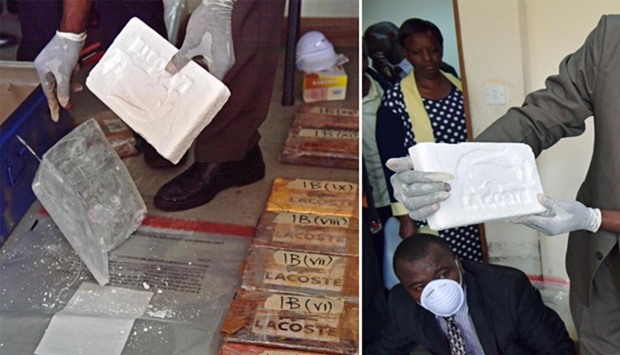The officer, Hamisi Massa, was exhibiting evidence in a case in which British sugar trader Jack Marrian is accused of smuggling 99.7 kilogrammes (220 pounds) of cocaine into Kenya.
On Friday, the second trial day, the court relocated to the Department of Criminal Investigations in order to witness the seized cocaine, all 90 packages.
The packages were found on a Wednesday in late July stashed in seven sacks hidden inside a container of Brazilian sugar at Mombasa port.
Marrian, the 31-year old managing director of the company that had imported the sugar, was charged eight days later along with his clearing agent Roy Mwanthi. Both men deny the charges.
- Aristocratic connection -
The case has attracted attention partly because the cocaine seizure was large by Kenyan standards -- with an estimated street value of $5.9 million (5.4 million euros) -- and partly because of Marrian's lineage: he is the son of a British aristocrat whose family owns Cawdor Castle, the legendary home of Shakespeare's Macbeth, and he went to school with the Duchess of Cambridge.
Defence lawyer Andrew Wandabwa on Friday picked holes in the prosecution's allegation that Marrian was the owner of the cocaine, as well as the sugar.
While cross-examining prosecution witness Massa, the defence lawyer drew the court's attention to the presence of a duplicate seal found inside the shipping container along with the cocaine.
Wandabwa said this was ‘the hallmark’ of a style of smuggling known as ‘rip-on, rip-off’, whereby cartels place their illicit cargo inside a legal consignment shipped by an unwitting owner.
‘Would you agree the smoking gun, as far as the owner of the drugs is concerned, is that unused seal?’ Wandabwa asked.
‘Probably, yes,’ Massa replied. ‘People could be using the transactions of others to transact illegal business without the knowledge of the owner.’
The sugar and cocaine were packed at Port of Santos in Brazil then shipped to Kenya via Valencia, Spain. Spanish police and the US Drug Enforcement Administration (DEA), which tipped-off Kenyan authorities, believe the drugs were destined for the European market but something went wrong and they were not off-loaded in Spain as planned.
Nevertheless, Marrian and Mwanthi were arrested and charged after their names were seen on shipping documents.
- Lacoste crocodile coke -
Each brick of cocaine seized was about the size and heft of a hardback Bible.
Wearing surgical gloves and using a carpet cutter knife Massa cut open a series of the packages removing an outer layer of shrink-wrap to reveal a strip of coloured nylon and a Lacoste clothing brand sticker, complete with crocodile logo.
Beneath the wrapping the densely packed kilo blocks of cocaine were embossed with the same Lacoste stamp, believed to be the signature of whichever cartel made the drugs (investigators say similar blocks of Lacoste-stamped cocaine have been found on the US market).
As the final layer was cut away the chemical tang of cocaine drifted towards the magistrate, lawyers and police officers.
After the thrid brick was opened Mwanthi, who was sitting closest by, asked to leave the room because the fumes were making him feel ‘a bit funny’ while Marrian was handed a dust mask.
Once the cocaine was resealed and packed back into a series of seven metal boxes of the kind that can be bought on the roadside for a few dollars, the haul was carried away, back to the CID armoury.
Magistrate Derrick Kuto later adjourned the case until January 19 when it will resume at Kibera law courts.

